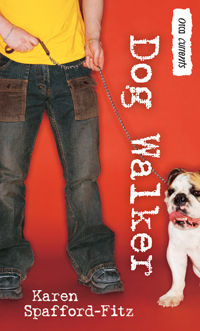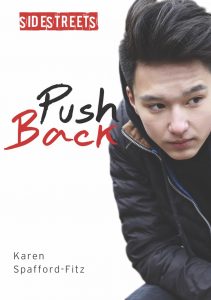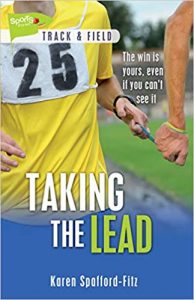Welcome to Cantastic Authorpalooza, featuring posts by great Canadian children’s writers! Today’s guest: Karen Spafford-Fitz. Take it away, Karen!
Grab Your Yoga Mat: Flexibility in Writing Kidlit
Even before I sent away my very first query package, I’d heard stories about the long, torturous waits for a response from publishers, and about the demoralizing form-style rejection letters one might expect. So I was not surprised when those things occurred.

Thirteen years and six kidlit books later, I have however experienced other surprises. Case in point… when I sent a query to the editor of the Orca Soundings series for reluctant high-school readers, I got a response back in just three weeks.
What surprised me even more though was the response did not come from the high-school editor who I had queried. Rather, it was from the editor of a new hi-lo series for middle-grade students.
In her letter, this editor said my submission had been passed internally around the publishing house. And while the editorial team liked my story, they felt Dog Walker was better suited to a younger audience. She further asked if I would rewrite the story to make the content appropriate for younger readers.
It took me approximately one second to decide that yes, I’d be happy to make some changes. And so, by the time I submitted the next draft, my hormonal protagonist and his high-school buddies were no longer looking for sex. Rather, they were somewhat girl-crazy and hoped to eventually land a date or two. Also, a party scene—originally a high-school beer bash—morphed into a birthday party with some awkward dancing and minor food fighting. After more fine tuning with my editor, Orca Book Publishers released Dog Walker, my first middle-grade book, several months later.

Fast forward ten years to when I finished a new young adult story entitled Push Back featuring a troubled sixteen-year-old runner. Facing charges of break and enter, trespassing, and assault causing bodily harm, Zaine enters into a restorative-justice agreement to try to get the charges dropped. Zaine’s actions led to Mr. Giezenman breaking an ankle and with “Geezer” now unable to train his vision-impaired grandson for a five-kilometre race, that task falls to Zaine.
But—surprise! Upon submitting Zaine’s story, my editor told me that I had not written one book, but two: a restorative-justice story, and a running story. The happy surprise is that Zaine’s story led to an unexpected two-book deal… an edgy YA title called Push Back (Lorimer: 2018) and a middle-grade sports story called Taking the Lead (fall 2019).
The less happy surprise is that pinpointing the line between Zaine’s story and the story about Jonas, my new sports-story protagonist, was complicated. Zaine also needed a new restorative-justice consequence that did not happen on a track or a running trail. I therefore created the DTO (“Despite the Odds”) program, an alternative school setting that Zaine attends, along with Nina the pregnant goth girl, Slater the gambling addict, Astrid the cyber bully, and Lucas—an angry teen dealing with a partial leg amputation who Zaine must assist in order to fulfill his restorative-justice consequence in Push Back.

As for the unexpected second book entitled Taking the Lead, I expanded on Jonas’s Track and Field Team experiences throughout his final year of junior high. When Jonas’s principal notices he has not completed his required volunteer hours, she pulls him from the team. They later strike a deal: Jonas can compete at the City Meet if he makes up his volunteer hours by training Darien, the nephew of his miserable English teacher, for a five-kilometre race. Since Darien is vision-impaired, Jonas must do all the training and the race while tethered to Darien.
Although Dog Walker, Push Back, and Taking the Lead, did not proceed according to my original vision, they became stronger, better-selling titles because of my publishers’ input and lots of story flexibility. I realize not all writers perhaps share my warm sentiments about the redirections their stories might have taken. For me though, flexibility has been key in producing books that hopefully encourage a more respectful and informed world, while offering a positive reading experience for young people.